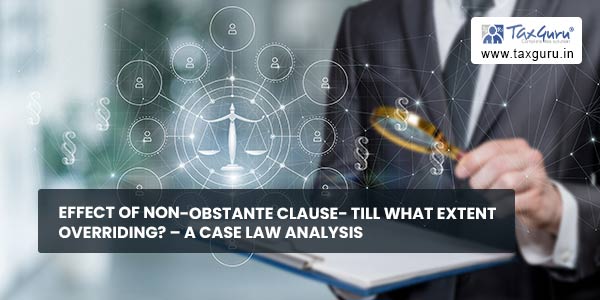The legislative intent behind inserting non-obstante clause in any provision is to enforce overriding effect of that provision over any other provision in that law or any other prevailing law. When two conflicting views arise from two distinct provisions, it would create chaos in overall implementation of that law. In order to overcome such difficulty, non-obstante clause is inserted in one provision, which would supersede other provisions, whenever necessary, as deem fit by the law makers.
Yet, such non-obstante clause always surround with questions of its overall impact and applicability. Would it really supersede every other provision of the law? Would other provisions become redundant when hit by provision containing non-obstante clause? The simple answer is NO!
Time to time, various High Courts and Supreme Court have looked into this substantial question of law and delivered some remarkable principles on interpretation.
Recently one such land mark judgment was delivered by the Honorable Gujarat High Court in case of Amar Jwellers Ltd. ( 2022) Tax Corp (DT) 86956 (HC-Gujarat ).
In this judgment, the Honorable High Court has not only discussed past judicial rulings but also laid down some fundamental principles on interpretation of non-obstante clause and its impact on other provisions of the Act.
The court finally concluded that; non-obstante clause any provision would not disentitle other provisions from its applicability.
Brief Facts of the Case:
Assessee is engaged into the business of manufacturing and trading of jwellery.
During the 2013, a search u/s 132 was conducted on the assessee.
According its assessment for the AY 2013-14 completed under search provisions, without making addition.
Afterwards, during 2019, assessee was served with notice u/s 148 seeking to re-open the case for the AY 2013-2014.
In pursuant to notice u/s 148, assesse filed Return of Income and also asked for reasons for re-opening of assessment.
Accordingly, revenue provided reasons based on information received from investigating wing of the department, regarding bogus purchases made by the assessee.
Assessee raised its objections, which were duly disposed by the department.
Finally, assessee filed writ application before the High Court, questioning the legality and validity of the impugned notice, issued u/s 148 of the Act, seeking to re-open an assessment which was already under taken u/s 153A of the Act.
Plea on behalf of the Applicant:
The arguments of the counsel, appeared for the applicant, are summarized as below:
The main plea of the counsel was of non-obstante clause embedded in the Section 153A(1) of the Act.
According to him, assessment in case of search or requestion u/s 153A/153C and re-assessment u/s 147 are two distinct provisions and applied in different scenario. Since section 153A starts with non-obstante clause, it is complete code in itself and provisions relating to normal assessment would not apply to search cases.
Once search action is under section 132 has been carried out and material has been recovered from the assessee , the “undisclosed income” shall be bought to tax. Once that happens, it is impossible to envisage “escapement of income chargeable to tax” within the meaning of Section 147 to invoke re-assessment.
He heavily relied on earlier judgment of the Gujarat High Court in case of Cargo Clearing Agency (2008) 307 ITR 1 (Guj.).
The comparison was also drawn between erstwhile provisions of Chapter XIVB and present Chapter -XIV.
Plea on behalf of the Revenue:
The arguments of the counsel, appeared for the applicant, are summarized as below:
According to counsel, the non-obstante clause in Section 153A merely dispenses with the procedure aspect of the Section 147
There is distinction between provisions of Chapter -XIV and Chapter -XIVB.
The erstwhile provisions of Chapter -XIVB , related to search was complete code in itself, while under the present provisions of
Chapter -XIV, search assessment u/s 153A is carried out as per the provisions of Section 143(3) of the Act.
Hence, Search assessment is governed by the normal assessment procedure only.

Analysis by the Honorable High Court:
The Honorable High Court beautifully craved out connotation of the non-obstante clause.
In its words “non obstante clause has two parts- the non obstante clause and the enacting part. The purpose of enacting a non obstante clause is that in case of a conflict between the two parts, the enacting part will have full sway in spite of the contrary provisions contained in the non obstante clause. Therefore, the object and purpose of the enacting part should be first ascertained and then the assistance of the non obstante clause should be taken to nullify the effect of any contrary provision contained in the clause”
“Normally the use of the phrase by the Legislature in a statutory provision like notwithstanding anything to the contrary contained in this Act is equivalent to saying that the Act shall be no impediment to the measure. Use of such expression is another way of saying that the provision in which the non-obstante clause occurs usually would prevail over the other provisions in the Act. Thus, the non-obstante clauses are not always to be regarded as repealing clauses nor as clauses which expressly or completely supersede any other provision of the law, but merely as clauses which remove all obstructions which might arise out of the provisions of any other law in the way of the operation of the principle enacting provision to which the non-obstante clause is attached.
It held that there is fundamental difference between erstwhile provisions of Chapter -XIVB and current provisions of Chapter -XIV, though both dealing with search cases.
As per the provisions of Chapter -XIVB, addition is restricted to undisclosed income, based on evidence found in the course of search or other post search material. While there is no such conditions in present Section 153A, related to search. Hence, post 01.06.2003, search assessment is carried out like normal regular assessment and accordingly, all provisions related to normal assessment would apply to search assessment u/s 153A.
The Court affirmed the argue of the Revenue that; Applicability of non-obstante clause in the Section 153A is limited to procedural aspects of the provisions of the Section 147 like reasons to believe, issuance of notice, time limit for completion of assessment
Honorable Court ultimately conclude that, assessment undertaken u/s 153A of the Act can be re-opened u/s 147 of the Act.
Key Take Aways from this Judgment:
The presence of non-obstante clause in provision wont repeal applicability of other provisions
It is true that; Non-obstante clause is inserted in any provision to give overriding effect over other provisions in case of contrary views but that does mean that; it would also override its applicability when there are NO contrary views. In such case, both the provisions would apply alike.
Erstwhile provisions related to search, embedded in Chapter-XIVA was complete code in itself.
It was categorically dedicated to “undisclosed income” derived from search and post search material. Hence, there was no scope for
“escapement” of income, when income is assessed under Chapter-XIVA.
While, post 01.06.2003, search assessment is governed by the provisions of Chapter-XIV.
Chapter-XIV deals assessment procedure which include regular assessment, re-assessment as well as search assessment.
Hence, when assessment u/s 153A is completed, it is incorrect to conclude that there is no “escapement” of income. Because there may be.
The non-obstante clause in the Section 153A won’t dilute applicability of the provision of the Section 147.
Therefore, when assessment u/s 153A is completed, it can never be re-opened u/s 147 is incorrect statement in law.
Concluding Remarks:
Interpretation of statue has always remained evolving area. Though there are some guiding rules and principles on interpretation, past judicial precedents play major role.
In case of the Income Tax Act,1961, ever since its inception, or even before , we have witnessed some landmarks rulings on interpretation of income tax law. Such rulings have become milestone and help even today to interpret various complex provisions of the income tax law. I have attempted to discuss one such ruling on “non-obstante clause”. It has all the potential to become benchmark ruling on interpretation of non-obstante clause, in future!





